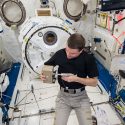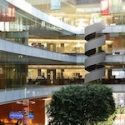UW-Madison instilling science literacy in South Africa
In November, representatives from UW–Madison will attend the inauguration of the southern hemisphere’s largest telescope, the Southern African Large Telescope (SALT). UW–Madison is one of nearly a dozen international institutions that partnered with the South African government to build SALT, including universities in Russia, Poland, New Zealand, Germany and the United States.
For the government of South Africa, building SALT was not just a way to join the elite, global astronomical community. “It’s more than just a telescope for a handful of astronomers. The project was designed to help raise the overall science and technology literacy in the general South African population – a population that has been denied access to math and science education for a very long time,” says Eric Wilcots, UW–Madison associate professor and chair of astronomy.
In early 2000, when work on SALT began in earnest, UW–Madison agreed to design and build the telescope’s primary imaging instrument, funding approximately 20 percent of the SALT project, in exchange for access to the telescope. As a condition of their partnership, UW–Madison agreed to provide “collateral benefits” aimed to boost South Africa’s scientific knowledge and expertise.
Already, the fruits of this unique program can be seen on the UW–Madison campus, where eleven South African science teachers will complete teacher enhancement courses this summer. This group is the third cohort of mainly black and colored South African teachers to visit UW–Madison through the SALT project.
Until fairly recently, the two largest ethnic groups in South Africa – blacks and coloreds, totaling nearly 90 percent of the population – had very little exposure to science. After dismantling apartheid throughout 1990 and 1991, democratic elections were held in 1994. Among many novel initiatives, the new South African government decided to bring the nation’s scientific capabilities up to international standards, particularly in fields where South Africa could make a unique contribution, including astronomy, indigenous medicine and human anthropology. This broad goal eventually gave rise to SALT.
South Africa chose partners that could provide the funding and technical expertise necessary to build a world-class telescope. UW–Madison was selected to build the telescope’s main instrument, a prime focus imaging spectrograph (PFIS), due to previous experience building lightweight instruments for the United States space program. By design, the instrument must be mounted high above the telescope’s mirrors.
“The beauty of PFIS is that it’s like a Swiss army knife. It is a single instrument with many different modes of operation,” says Wilcots. In addition to functioning as a spectroscopic telescope, allowing astronomers to gaze into the history of nearby galaxies, PFIS can also gather polarimetry data, allowing scientists to study the matter that exists between the telescope and the source of light it is observing.
Now, five years later, the telescope is about to collect its first science grade photons, an important milestone in the life of every telescope called “first light.”
Although the telescope is nearly operational, collateral benefits have just begun. “Frankly, I’m not sure the astronomy department or the university quite knew what they were going to do to provide collateral benefits. It meant no buildings, no one-time conferences, no junket tours,” says UW–Madison genetics professor Raymond Kessel. “It meant they were going to work to develop an ongoing relationship in science education [with South Africa].”
UW–Madison is utilizing its own in-house program, called the Wisconsin Teacher Enhancement Program (WisTEP), to fulfill the collateral benefits requirement. In its 20th year, WisTEP is the longest-running teacher enhancement program in the country. Program participants take science and health courses during the summer. While some classes focus on up-to-date research and information on the subject, others emphasize effective teaching methods. “[WisTEP] is made to empower teachers, to enhance their own comfort level and ability to teach science,” explains Kessel, who is also WisTEP’s program director.
Primarily funded by annual donations from the Evjue Foundation, WisTEP’s South African Exchange Program (SAEP) typifies the ideals of the Wisconsin idea. “There is only one requirement for South African teachers: that they contribute when they go back home,” says Kessel.
In South Africa, where class sizes easily reach 50 students, effective teaching methods are crucial for classroom learning. “With so much time spent on crowd control, how much teaching and learning can happen in this environment?” asks Lyrice Trussel, the health curriculum advisor for the school district encompassing Cape Town. She notes that teachers have access to very few classroom resources.
Herman Legoabe, a 12th grade biology teacher at Thuto-Ke-Maatla (Education is Power) high school in Johannesburg, is looking for better ways to engage students. “It is best to get students to ask potentially scientific questions that they can test in the classroom,” he says. “They feel really special when they come up with the question and then they work on the question.”
Legoabe’s first experience with WisTEP in 2001 was fruitful. Using ideas from a fast plants course taught by Paul Williams, Legoabe and his students entered a poster competition that asked competitors to “convey something genetically.” “Our school was the prizewinner and we received computer equipment valuing 10,000 rands – one brand new computer and printer,” says Legoabe.
Only the most highly motivated educators are chosen by Kessel to participate in WisTEP in the hopes that when these teachers return to South Africa, they will liberally share their new knowledge and teaching methods with their students and fellow teachers. As a curriculum advisor, Trussel is already making plans to maximize WisTEP’s influence in her school district. “I will introduce the information and methods I learned here into the current curriculum of my school district,” she says.
Trussel acknowledges the enormous challenges teachers face as they work to improve science education in South Africa. On the whole, she believes that teachers are up to the task and are aware of their fundamental role in securing South Africa’s future as a science-literate, prosperous nation. “A majority of teachers understand that the nation has an agenda and that teachers form an integral part of that agenda.”
Tags: research, space & astronomy



